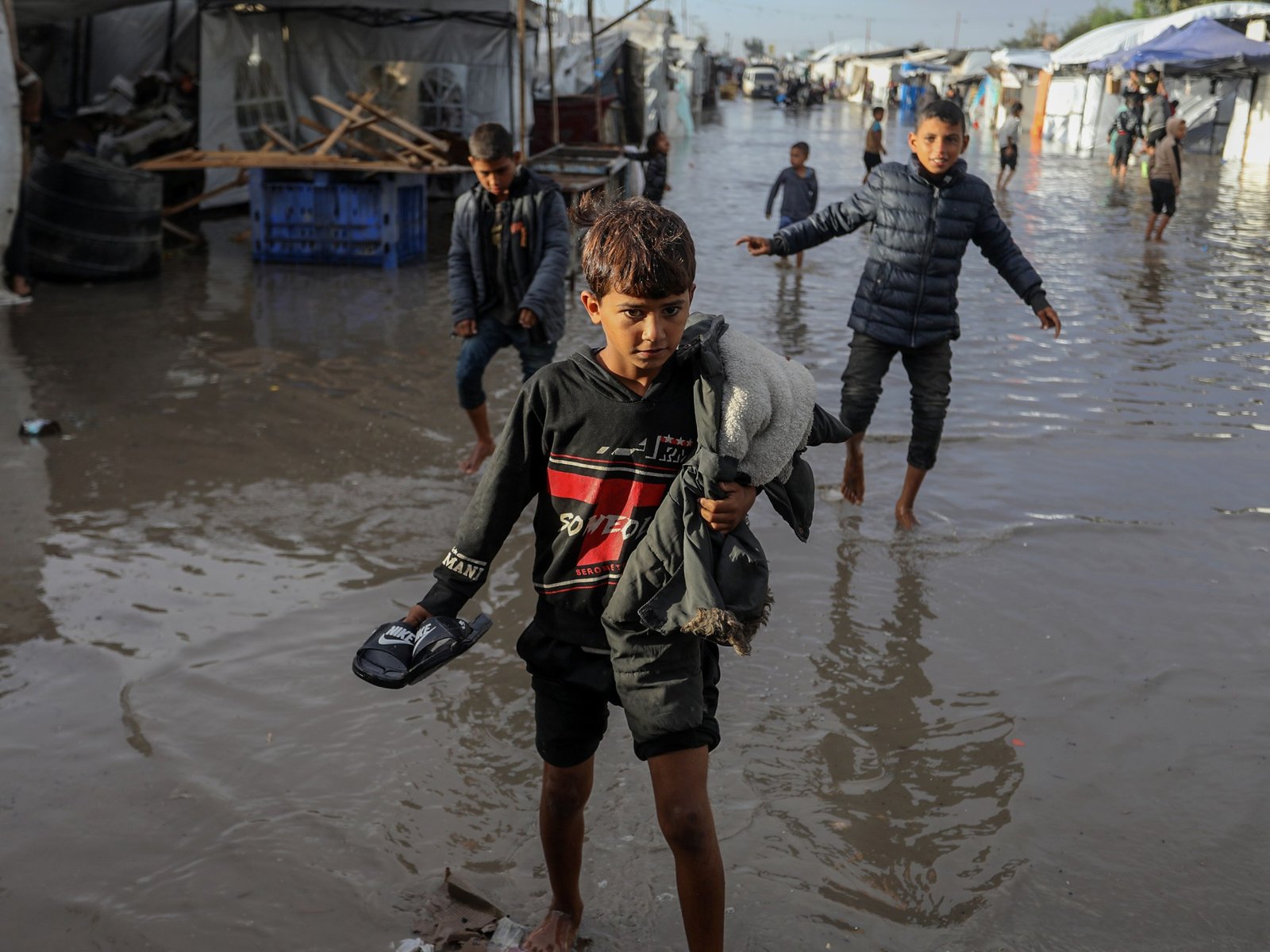More than 288,000 families in Gaza are facing a shelter crisis as Israeli restrictions on humanitarian supplies worsen the situation for Palestinians displaced by the war, the territory’s government media office says.
Heavy rain in recent days has left thousands of temporary tents submerged in Gaza, leaving Palestinians facing conditions that “no society can tolerate”, local authorities said in a statement on Monday.
Recommended Stories
list of 3 itemsend of list
The government media office warned that Palestinians are facing “the most dangerous humanitarian disaster” since the war began, as Israel has “deliberately deepened the catastrophe” through a blockade of essential shelter materials.
“We strongly condemn this ongoing crime against civilians under the (Israeli) occupation,” it said.
“We hold the occupation fully responsible for the suffering of thousands of displaced people who are facing the rigors of winter without safe shelter or basic services, and for its devastating crime of insisting on completely closing the crossing and preventing the entry of shelter supplies.”
The flooding began on Thursday when the first winter storm hit Gaza. The United Nations confirmed that more than 13,000 homes were affected within a few hours.
Conditions worsened as rain continued over the next few days, flooding the dilapidated tents that had housed the displaced families for nearly two years.
Many displacement camps are located at lower altitudes than the surrounding areas. Al Jazeera’s Hani Mahmoud reported on Monday that “some areas were completely submerged” after water came in from everywhere.
Gaza officials said the enclave needed 300,000 tents and mobile homes to provide basic shelter, a figure they had “clearly stated” for months.
However, Israel has blocked their entry despite a ceasefire that came into effect on 10 October.
According to UN figures, more than 80 percent of buildings in Gaza were damaged or destroyed during the war, leading to mass displacement.
Human rights experts say Israel’s campaign to turn most of Gaza into rubble is tantamount to genocide. According to the United Nations, actions constituting genocide include “intentionally inflicting on (a) group conditions of life which are designed to bring about its physical destruction in whole or in part”.
On Monday, the government media office accused Israel of “continuing its policy of banning and preventing the entry of tents, tarpaulins and plastic covers” while keeping the border crossings closed and “withdrawing from implementing humanitarian protocols” signed as part of the ceasefire.
COGAT, the Israeli military agency responsible for coordinating aid deliveries to Gaza, has repeatedly rejected accusations that it is restricting humanitarian supplies.
But Philippe Lazzarini, head of the UN agency for Palestinian refugees (UNRWA), described the situation last week as “sadness on top of sadness” and warned that Gaza’s fragile shelters “quickly flood, leaving people’s belongings drenched”.
UNRWA said it had enough supplies to fill 6,000 trucks in Jordan and Egypt, including food to sustain the entire population of Gaza for three months. Yet Israeli sanctions mean only half of the 500 to 600 aid trucks needed per day are entering the region.
UNRWA has also said that it cannot bring pens and notebooks into the area under import rules imposed by Israeli authorities.
Aid groups warned in early November that some 260,000 Palestinian families, out of a total of about 1.5 million, faced insecurity as winter approached.
Natalie Boukli, a senior UNRWA official, said Israel was violating international humanitarian law by maintaining the embargo. Boukli cited the Fourth Geneva Convention and a recent International Court of Justice ruling that found Israel must ensure Palestinians “the essential supplies of daily life.”
British Foreign Secretary Yvette Cooper said during a visit to aid warehouses in Jordan this month that Israel has “no excuse” for delaying humanitarian supplies.
‘Aid sanctions are purely political’
Professor Mukesh Kapila of the University of Manchester said the restrictions represented a deliberate strategy rather than logistical problems.
“Gaza is one of the easiest areas to access where the humanitarian crisis is taking place, so this is completely a political act,” he told Al Jazeera.
“This is a deliberate Israeli strategy to maintain pressure on Hamas over hostages and possibly disarmament, but it is increasing humanitarian suffering in Gaza.”
The statement from the government media office called on United States President Donald Trump and mediating countries to “take serious and immediate action to force the occupation to adhere to the agreement signed” in the ceasefire and humanitarian protocols.
According to Gaza’s health ministry, at least 266 people have been killed since the ceasefire began and Israeli forces are carrying out almost daily attacks even in areas from which troops were supposed to withdraw.
